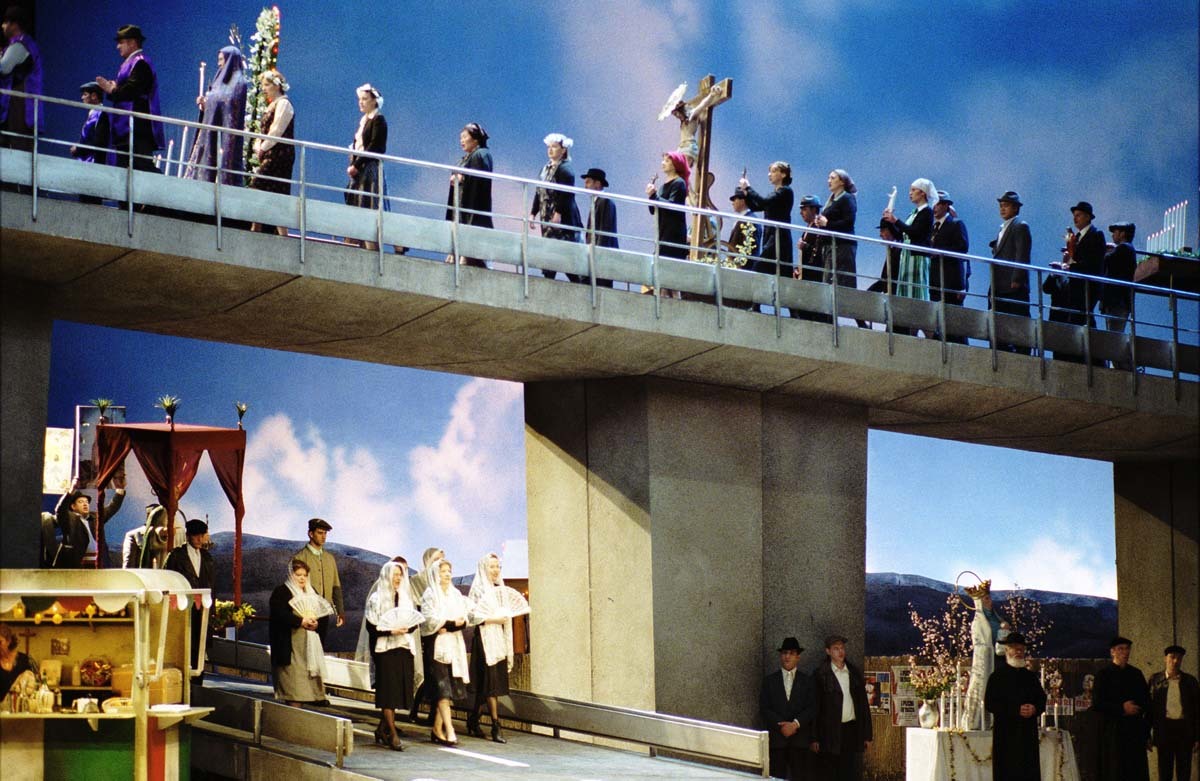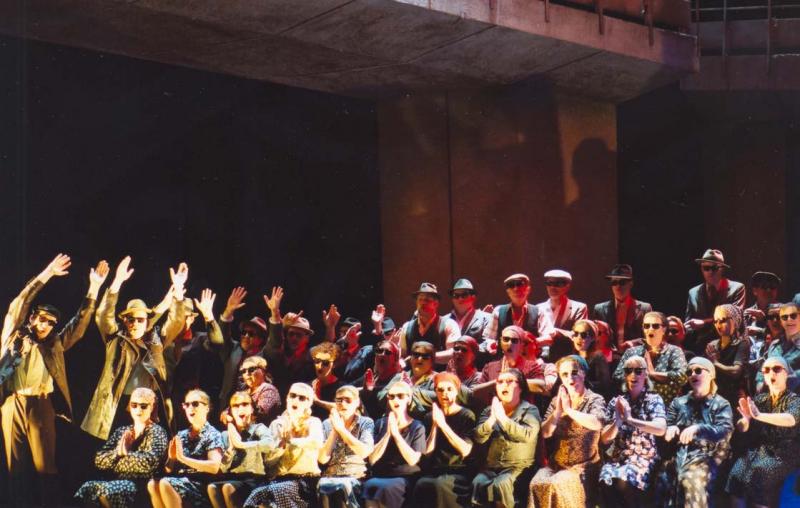Review: CAV/PAG at Deutsche Oper Berlin
 Why is opera dying? One look onstage at Deutsche Oper Berlin's production of Cavalleria rusticana/Pagliacci provides a textbook example of everything that is wrong with this once-great art form in its present state. Audiences are leaving the theater in droves, scratching their heads thinking "What the hell did I just see?"
Why is opera dying? One look onstage at Deutsche Oper Berlin's production of Cavalleria rusticana/Pagliacci provides a textbook example of everything that is wrong with this once-great art form in its present state. Audiences are leaving the theater in droves, scratching their heads thinking "What the hell did I just see?"
Regietheater (German for director's theater) is the post World War II practice of modern theatrical production that has a stranglehold on subsidized European Theater, and now increasingly rears its ugly head in the USA. Regietheater allows a director (and I use the word very generously) complete freedom in creating a "concept" that can (and mostly does) ignore a composer's, lyricist's, or writer's original, specific intentions for their creations. In short, in Regietheater, the Director is "God" and woe be unto all others. These "directors" feel that their ideas supersede any artistic input from the original creators of a work. In my opinion, Regietheater should be renamed "directorial masturbation." God only knows that masturbation has its place, but a public theatrical performance is no venue for this most personal of pleasures.
At the Deutsche Oper on Saturday night, David Pountney, director of Cav/Pag saddled these beloved works with a concept so profound in its stupidity that it was mind-blowing and jaw-dropping in its inanity. Filling the stage with inconsistent, half-baked, illogical ideas, he used every weapon in a director's arsenal to try and completely upstage his singer's performances. This director seems incapable of allowing a normal, human conversation to take place. Coupled with Silke Sense's asinine "Choreography" for the chorus, this Cav/Pag seemed more a parody of an operatic performance from a provincial old age home than an evening spent at one of the world's great opera houses. If there is a special club in Hell for bad stage directors, Mr. Pountney has earned a lifetime membership.
Fortunately, the musical values at this performance were very high. The orchestra, under the direction of Stefano Ranzani, played with nuance, clarity and a shimmering tone that brought the great Italian romanticism of these scores to the fore. There were moments of exquisite beauty coming from the orchestra pit.

The Deutsche Oper Chorus, under the direction of Jeremy Bines, is to be highly commended. Despite their abject misuse by both the director and choreographer, the chorus sang marvelously and added mightily to the evening's success.
The cast of Pagliacci was uniformly superior to that of Cavalleria rusticana. Erika Grimaldi and Thomas Lehman, despite the ludicrousness of the stage direction, provided the musical highlight of the evening with their passionate duet, "Silvio! A quest' ora," filling the cavernous theater with thrilling piano and pianissimo singing.
As Canio, Vladimir Galouzine sang with dramatic integrity and intensity. At the beginning of the evening, his middle register was somewhat leathery, but his high notes were never short of glorious. Mr. Galouzine truly came into his own during the spellbinding final scene "No, Pagliaccio non so!" As Beppo, lyric Tenor, Andrew Dickinson showed great promise.
In contrast to Pagliacci, throughout Cavalleria, there was not one moment of genuine emotion coming across the footlights. Vocally, Tatiana Meinychencko is an ideal Santuzza, singing with a plush soprano that easily rode above both orchestra and chorus. Unfortunately, Ms. Meinychencko was plagued with a costume designed by Robert Innes Hopkins, (who was also responsible for the set) that was most uncomplimentary to her figure. Additionally, she needs the discipline and support of a strong stage director. Her performance style is better suited to silent movie histrionics than any type of naturalistic emoting and was at times laughable in its exaggeration. Gaston Rivero has a serviceable Tenor and played Turiddu as a boorish lout. His great dramatic aria "Mamma, quel vino e generoso" left this viewer cold. Dallbor Jenis, who played both Alfio and Tonio in Pagliacci acquitted himself better in the latter as in the former. Mr. Jenis sounded as if he were a bit under the weather, and was fighting a scratchy throat throughout the evening. One hopes that is the case.
If one closed ones' eyes, there were pleasures to be had at the Deutsche Oper. Given the great verismo storytelling that should have been on display onstage, this is damning praise indeed.
All Photos, Copyright Bernd Uhlig. Reproduced with permission.
Add Your Comment
Videos
.png)
